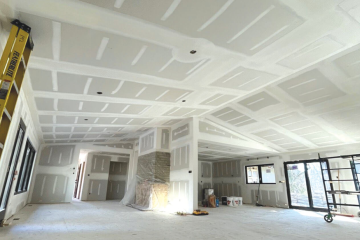Key Takeaways
- Understand the factors to consider when selecting a general contractor.
- Learn the importance of asking for references and checking past work.
- Discover the benefits of clear communication and detailed contracts.
- Get tips on researching and verifying contractor credentials.
- Find out how to handle issues and ensure the project stays on track.
Introduction
Renovating your home is a significant investment that can transform your living space and increase property value. There are a lot of decisions to be made, but choosing the appropriate contractor is one of the most important ones. With so many General Contracting companies available, it’s crucial to select one that matches your needs and expectations. An excellent contractor can bring your vision to life, while the wrong choice can lead to delays, budget overruns, and unsatisfactory results. This is exceptionally beneficial for those who are looking to construct metal buildings. Let’s delve into the essential aspects of selecting a contractor who will make your project a triumph.
Why Choosing the Right Contractor Matters
Selecting the right contractor is crucial because it affects every aspect of your renovation. A good contractor ensures that the project stays on schedule, within budget, and meets your quality expectations. Moreover, a skilled contractor can anticipate potential issues and address them proactively. According to Forbes, well-executed renovations can substantially boost your home’s market value, making the choice of contractor all the more critical. The importance of the contractor in the success of a renovation project can’t be overstated. From managing subcontractors to navigating building codes, the contractor’s role is multifaceted and pivotal. A skilled contractor will ensure that your remodel is completed to perfection by bringing a wealth of knowledge and experience to the table.
Factors to Consider When Selecting a Contractor
There are several factors you should evaluate before hiring a contractor:
- Experience: Look for a contractor with extensive experience in similar projects. This ensures they have the skills required to handle your specific renovation needs. The more experience a contractor has, the better equipped they are to deal with unforeseen issues that may arise during the project.
- Reputation: Ask friends and relatives for referrals and look up reviews online. Reputation is often a good gauge of a contractor’s level of customer service and quality of work. Good testimonies and reviews might reassure you about your decision, but bad comments can act as a red flag.
- Insurance and Licensing: Ensure the contractor has the necessary licenses and insurance to perform the work. A license certifies that the contractor satisfies the state’s basic standards, whereas insurance shields you from responsibility in the event that mishaps or property damage occur while the job is being completed.
- Detailed Proposal: Request a comprehensive proposal with a precise breakdown of expenses and due dates. A well-drafted proposal demonstrates the contractor’s professionalism and helps you understand what to expect. It should outline the scope of work, list all materials, and mention any potential additional costs.
The Importance of References and Past Work
One of the most effective ways to gauge a contractor’s reliability and quality of workmanship is by checking references and reviewing past projects. Get a list of prior customers and get in touch with them later to find out about their experiences. Additionally, visit completed job sites when possible to see the contractor’s work firsthand. As per The New York Times, viewing past work can provide a clear idea of the contractor’s attention to detail and craftsmanship. Speaking with past clients allows you to ask specific questions about the contractor’s punctuality, ability to stay within budget, and overall professionalism. A visit to a job site can reveal the contractor’s workmanship quality and attention to detail. If a contractor hesitates to provide references or show examples of past work, it may be a red flag signaling underlying issues.
Communication and Contracts
Clear communication is essential for a smooth renovation process. Make sure the contractor is aware of your goals and expectations. Talk about the preferred communication channel, such as phone, email, or in-person meetings, as well as the frequency of updates. You can keep informed and take quick action to resolve any concerns by receiving regular updates. A detailed contract is just as vital. The scope of work, schedule, payment terms, and protocols for resolving modifications or disagreements should all be included. Having everything in writing helps prevent misunderstandings and provides legal protection. In order to prevent time and stress when problems develop, the contract should also contain provisions for ending the agreement in the event of a breach and dispute resolution methods.
How to Research and Verify Credentials
Before making your final decision, verifying the contractor’s credentials is critical. Check with local licensing authorities to confirm that their licenses are up-to-date. This verifies that the contractor is authorized by law to carry out the job, which is typically completed online. Check their insurance policy to shield yourself from any obligations. Additionally, look for any professional affiliations or certifications the contractor may have, as these can be indicators of their commitment to ongoing education and industry standards. Membership in professional organizations often requires adherence to a code of ethics, ongoing education, and a certain level of experience, all of which can provide additional peace of mind.
Dealing with Issues During the Project
When renovating, problems can happen even with the best-laid plans. It’s important to deal with them quickly and efficiently. The key is to handle them swiftly and effectively. Maintain open lines of communication with your contractor and address any concerns immediately. Document any issues in writing and keep a log of communications. To settle disagreements, consult your contract, and don’t be afraid to get legal counsel if needed. Proactively and actively participating in the project helps guarantee that it stays on course and fulfills your objectives. Setting up regular check-ins with the contractor can help catch and address problems early, preventing them from escalating and causing more significant delays or cost overruns.
Final Thoughts
A crucial first step in guaranteeing the success of your home renovation is selecting the correct contractor. You can choose a professional who will produce high-quality work by taking into account aspects like expertise, reputation, and communication abilities. Take the time to research and verify credentials, and remember the importance of detailed contracts and proactive communication. Your renovation job can go well and be a fulfilling experience if you use the proper approach.




